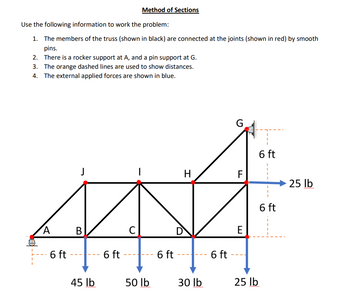
Structural Analysis
6th Edition
ISBN: 9781337630931
Author: KASSIMALI, Aslam.
Publisher: Cengage,
expand_more
expand_more
format_list_bulleted
Concept explainers
Question
find forces Ax Ay Gx Gy

Transcribed Image Text:**Method of Sections**
**Use the following information to work the problem:**
1. The members of the truss (shown in black) are connected at the joints (shown in red) by smooth pins.
2. There is a rocker support at A and a pin support at G.
3. The orange dashed lines are used to show distances.
4. The external applied forces are shown in blue.
**Diagram Details:**
- **Truss Structure:** The truss is composed of several members connected at joints labeled A through G. The members form triangular and rectangular shapes indicating a typical truss design.
- **Supports:**
- A rocker support is located at point A, allowing for horizontal movement while providing vertical support.
- A pin support is located at point G, providing both vertical and horizontal support except movement is restricted in all directions.
- **External Forces:**
- Downward forces are applied at points B, C, D, and E: 45 lb, 50 lb, 30 lb, and 25 lb, respectively.
- A horizontal force of 25 lb is applied to the right at point F.
- **Distances:**
- The truss spans a total length divided into sections, each measuring 6 feet horizontally.
- Vertically, the section from F to G is also 6 feet high.
This setup is typical for analyzing static equilibrium and calculating internal forces within the truss members using the method of sections.
Expert Solution
This question has been solved!
Explore an expertly crafted, step-by-step solution for a thorough understanding of key concepts.
This is a popular solution
Trending nowThis is a popular solution!
Step by stepSolved in 2 steps with 2 images

Knowledge Booster
Learn more about
Need a deep-dive on the concept behind this application? Look no further. Learn more about this topic, civil-engineering and related others by exploring similar questions and additional content below.Similar questions
- Part C onlyarrow_forwardQ.2) Determine the moment about line OB due to the force F shown in figure below. The magnitude of force F is 800 N. y 500 mm 600 mm Y N A B | 225 mm 1 F 525 mm O 400 mm Xarrow_forward22:03 X Two forces are applied to a hook. Variable F₁ F₂ a b B с d wamap.org Value 50 lb 30 lb 2,5 ft 3.5 ft 5.5 ft 2.5 ft 13/12 resultant force FR i. α ii. B iii. Y a b Values for the figure are given in the following table. Note the figure may not be to scale. F₂ F₁ A y a. Write each force (F₁,F₂) as cartesian vectors. b. Find the resultant force FR, express as a cartesian vector c. Find the magnitude of the resultant force FR d. Determine the coordinate direction angles of thearrow_forward
- 6. What is the vector cross product r X F? r= 0.5i 0.3j + 0.9k [m] and F= -43i+54j + 61k [N]arrow_forwardF=20# A I want to replace force F from point B to point A. I can do it by I want to replace force F from point B to point C. I can do it byarrow_forward12. If z = x.f)+F). prove that az (i) x ax a² z +2xy ax. ay a2z +y2. =0 ay 2arrow_forward
- Give accurate response. I am mostly confused with S2 and S3. does S2 contain the zero vector?arrow_forwardWhich among the following is the equation of the elastic curve for a cantilever beam of length L, modulus of elasticity E, moment of inertia I, and a concentrated force P at the free end? a. El y(x) = P x* + PL 24 b. El y(x) = P* PL 24 c. El y(x) = PL d. El y(x) = + PL O a. Equation B O b. Equation A O c. Equation D O d. Equation Carrow_forwardplease show all detailsarrow_forward
- There are two questions to answer. The first question is a truss problem and the second is a frame problem. Upload homework solutions to both problems. Solutions must have free body diagrams and equilibrium equations and show each step.arrow_forward4. If z=x+2xy + y³ and x =r cos 0 and y = r sin 0, find in their simplest forms. Əz and ar BIS деarrow_forwardAnswer fastarrow_forward
arrow_back_ios
SEE MORE QUESTIONS
arrow_forward_ios
Recommended textbooks for you

 Structural Analysis (10th Edition)Civil EngineeringISBN:9780134610672Author:Russell C. HibbelerPublisher:PEARSON
Structural Analysis (10th Edition)Civil EngineeringISBN:9780134610672Author:Russell C. HibbelerPublisher:PEARSON Principles of Foundation Engineering (MindTap Cou...Civil EngineeringISBN:9781337705028Author:Braja M. Das, Nagaratnam SivakuganPublisher:Cengage Learning
Principles of Foundation Engineering (MindTap Cou...Civil EngineeringISBN:9781337705028Author:Braja M. Das, Nagaratnam SivakuganPublisher:Cengage Learning Fundamentals of Structural AnalysisCivil EngineeringISBN:9780073398006Author:Kenneth M. Leet Emeritus, Chia-Ming Uang, Joel LanningPublisher:McGraw-Hill Education
Fundamentals of Structural AnalysisCivil EngineeringISBN:9780073398006Author:Kenneth M. Leet Emeritus, Chia-Ming Uang, Joel LanningPublisher:McGraw-Hill Education
 Traffic and Highway EngineeringCivil EngineeringISBN:9781305156241Author:Garber, Nicholas J.Publisher:Cengage Learning
Traffic and Highway EngineeringCivil EngineeringISBN:9781305156241Author:Garber, Nicholas J.Publisher:Cengage Learning


Structural Analysis (10th Edition)
Civil Engineering
ISBN:9780134610672
Author:Russell C. Hibbeler
Publisher:PEARSON

Principles of Foundation Engineering (MindTap Cou...
Civil Engineering
ISBN:9781337705028
Author:Braja M. Das, Nagaratnam Sivakugan
Publisher:Cengage Learning

Fundamentals of Structural Analysis
Civil Engineering
ISBN:9780073398006
Author:Kenneth M. Leet Emeritus, Chia-Ming Uang, Joel Lanning
Publisher:McGraw-Hill Education


Traffic and Highway Engineering
Civil Engineering
ISBN:9781305156241
Author:Garber, Nicholas J.
Publisher:Cengage Learning